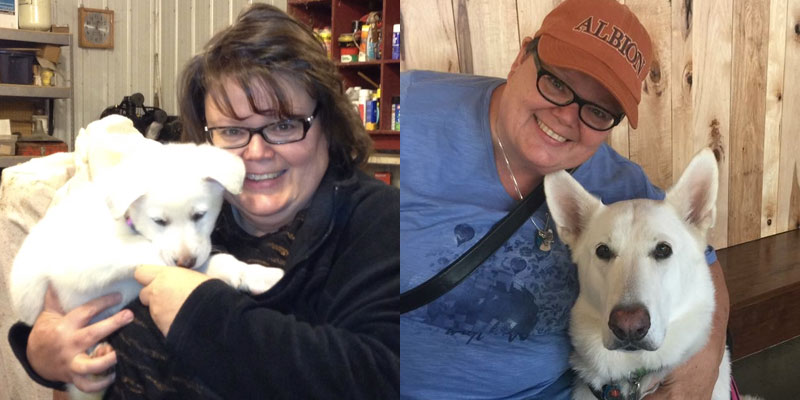Two years ago, Kelly Buchanan began to find herself on her face almost as often as she was on her feet until her German shepherd, Eirwen, came to her rescue.
“I would feel my feet going out from under me, and my first thought was to try to stop myself. But before I knew it, I would be down on my face,” said Buchanan. “It’s terrible to fall. It’s a feeling of being out of control. Having the wind knocked out of you and feeling yourself falling is very disorienting and embarrassing.”
In fall 2016, Buchanan developed a severe inner ear imbalance after suffering three back-to-back bouts of double pneumonia. She began losing her balance without warning, putting her on the floor. Because it happened so often, Buchanan’s doctor suggested that a service dog could be her answer.
Buchanan didn’t have to look far. She and Eirwen were already a well-established team.
Eirwen made the transition from best friend and companion to service dog without a hitch. She is now by Buchanan’s side everywhere she goes.
“She keeps me steady,” said Buchanan. “If I feel like I’m about to fall, she can do a command called ‘brace,’ where she steadies her front and back legs like a sawhorse. Then, I can put one hand on her hips and the other on her shoulders, and use her to help me get back up safely.”
The two have become a familiar sight at Alabama Power’s Corporate Headquarters in Birmingham. Buchanan, who works for Randstad, a temporary employment agency, is filling in this summer for an administrative assistant who is on medical leave.
“Eirwen gives me peace of mind that I am going to be able to do all aspects of my job and not have to ask for a lot of help,” said Buchanan. “I’m going to be able to move about the office and building safely without the fear of falling.”
From puppy to service dog
In 2015, Buchanan was looking for a puppy to train as a therapy dog when a breeder contact from Iowa sent her a photo of Eirwen. It was “love at first sight.” Buchanan, who lived in Arkansas at the time, was soon on the way to bring her new puppy home.
Buchanan immediately began obedience training, teaching Eirwen to respond to basic commands like, “Sit,” “Stay” and “Lie down.” Under Buchanan’s guiding hand, Eirwen completed the requirements for the American Kennel Club’s Canine Good Citizen (CGC) program and was certified as a therapy dog.
“We formed a really strong bond instantly,” Buchanan said. “She has always been very responsive to anything I ask of her.”
The team began making regular visits to hospitals, libraries and schools.
But Buchanan “had an itch” to do more. She soon volunteered as a trainer for Soldier on Service Dogs, an organization in Arkansas that provides service dogs to veterans suffering from post-traumatic stress disorder (PTSD) or traumatic brain injuries.
With Eirwen by her side, Buchanan trained two puppies and helped prepare them for their future handler. In each case, it was a yearlong process, with the puppies learning skills they needed as they traveled almost everywhere with Buchanan.
“Eirwen was like the big sister showing the puppies what to do,” said Buchanan.
Thus, when Buchanan began experiencing inner ear issues, Eirwen was the perfect fit. The training that Buchanan learned as part of the “puppy raiser” program through Soldier on Service Dogs helped her prepare Eirwen for her new job.
Buchanan said she has not fallen since Eirwen took over as her service dog. Even if Buchanan is not holding her leash, Eirwen is by her side, keeping her eyes glued to her handler.
There was one instance, Buchanan said, when she could have been badly injured if not for Eirwen.
“I was walking along a sidewalk and did not see the curb because it was not marked,” Buchanan said. “But Eirwen saw it. She stopped straight in her tracks and would not move. She prevented me from having a really nasty fall.”
A service dog or a pet – that’s the question
Service dogs help many people with disabilities live more independently.
Service animals are individually trained to perform work or specific tasks for a person with a disability, according to the Americans with Disabilities Act. They can be trained to pick up items for people in wheelchairs, provide stability for people who have difficulty walking, prevent a child with autism from wandering, or alert diabetic people of a drop or rise in their sugar levels. People who have seizures or hearing loss, as well as veterans with PTSD, can be greatly helped by a service dog.
“These animals are amazing,” said Frances McGowin, executive director of Service Dogs of Alabama. “They are lifesaving dogs. There’s no medical equipment that can do what these dogs do.”
McGowin said that because there is no registration for service dogs, some people are “abusing the privilege.” They are trying to pass off their pets as service dogs so they can take their furry friends on airplanes and into public places that only allow service animals. But there is a huge difference.
“Service dogs are highly skilled, professionally trained dogs,” McGowin said. “They do their job over everything else. Whether they are playing, resting or eating, these dogs will stop whatever they are doing if their handler needs them.”
Buchanan can testify to that fact, adding that Eirwen knows when her handler is especially dizzy and struggling to stay on her feet.
Buchanan said Eirwen is her key to independence.
“She has definitely been a blessing and a joy,” Buchanan said. “Knowing that I just have to hold onto her leash, and she’s strong enough to keep both of us safe and get me where I need to be, really means everything.”
Buchanan has one piece of advice for people who meet a service dog.
“If you see service dogs walking with their handler, that means they’re working, so just ignore them,” she said. “If they’re not working, you can ask to pet them. Eirwen is a ‘people person,’ so I will usually allow her to be petted if she’s not working at the time.”
For more information about service dogs, click here.
(Courtesy of Alabama NewsCenter)













